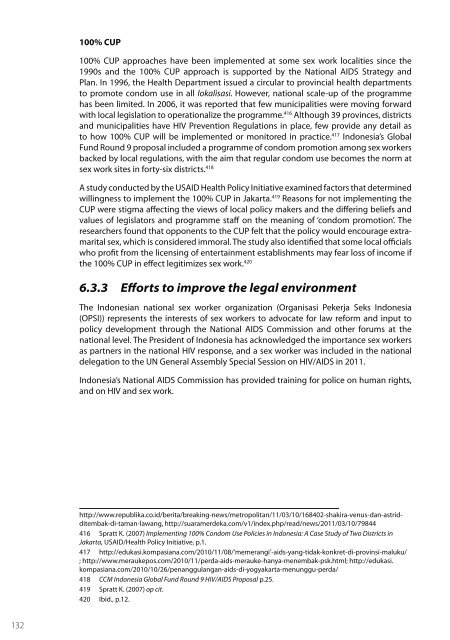SEX WORK AND THE LAW - HIV/AIDS Data Hub
SEX WORK AND THE LAW - HIV/AIDS Data Hub
SEX WORK AND THE LAW - HIV/AIDS Data Hub
You also want an ePaper? Increase the reach of your titles
YUMPU automatically turns print PDFs into web optimized ePapers that Google loves.
100% CUP<br />
100% CUP approaches have been implemented at some sex work localities since the<br />
1990s and the 100% CUP approach is supported by the National <strong>AIDS</strong> Strategy and<br />
Plan. In 1996, the Health Department issued a circular to provincial health departments<br />
to promote condom use in all lokalisasi. However, national scale-up of the programme<br />
has been limited. In 2006, it was reported that few municipalities were moving forward<br />
with local legislation to operationalize the programme. 416 Although 39 provinces, districts<br />
and municipalities have <strong>HIV</strong> Prevention Regulations in place, few provide any detail as<br />
to how 100% CUP will be implemented or monitored in practice. 417 Indonesia’s Global<br />
Fund Round 9 proposal included a programme of condom promotion among sex workers<br />
backed by local regulations, with the aim that regular condom use becomes the norm at<br />
sex work sites in forty-six districts. 418<br />
A study conducted by the USAID Health Policy Initiative examined factors that determined<br />
willingness to implement the 100% CUP in Jakarta. 419 Reasons for not implementing the<br />
CUP were stigma affecting the views of local policy makers and the differing beliefs and<br />
values of legislators and programme staff on the meaning of ‘condom promotion’. The<br />
researchers found that opponents to the CUP felt that the policy would encourage extramarital<br />
sex, which is considered immoral. The study also identified that some local officials<br />
who profit from the licensing of entertainment establishments may fear loss of income if<br />
the 100% CUP in effect legitimizes sex work. 420<br />
6.3.3 Efforts to improve the legal environment<br />
The Indonesian national sex worker organization (Organisasi Pekerja Seks Indonesia<br />
(OPSI)) represents the interests of sex workers to advocate for law reform and input to<br />
policy development through the National <strong>AIDS</strong> Commission and other forums at the<br />
national level. The President of Indonesia has acknowledged the importance sex workers<br />
as partners in the national <strong>HIV</strong> response, and a sex worker was included in the national<br />
delegation to the UN General Assembly Special Session on <strong>HIV</strong>/<strong>AIDS</strong> in 2011.<br />
Indonesia’s National <strong>AIDS</strong> Commission has provided training for police on human rights,<br />
and on <strong>HIV</strong> and sex work.<br />
http://www.republika.co.id/berita/breaking-news/metropolitan/11/03/10/168402-shakira-venus-dan-astridditembak-di-taman-lawang,<br />
http://suaramerdeka.com/v1/index.php/read/news/2011/03/10/79844<br />
416 Spratt K. (2007) Implementing 100% Condom Use Policies in Indonesia: A Case Study of Two Districts in<br />
Jakarta, USAID/Health Policy Initiative, p.1.<br />
417 http://edukasi.kompasiana.com/2010/11/08/‘memerangi’-aids-yang-tidak-konkret-di-provinsi-maluku/<br />
; http://www.meraukepos.com/2010/11/perda-aids-merauke-hanya-menembak-psk.html; http://edukasi.<br />
kompasiana.com/2010/10/26/penanggulangan-aids-di-yogyakarta-menunggu-perda/<br />
418 CCM Indonesia Global Fund Round 9 <strong>HIV</strong>/<strong>AIDS</strong> Proposal p.25.<br />
419 Spratt K. (2007) op cit.<br />
420 Ibid., p.12.<br />
132
















